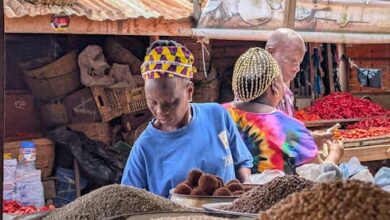The Rise of Decentralized Credit – How Gluwa Challenges the Status Quo

The Rise of Decentralized Credit – How Gluwa Challenges the Status Quo
Estimated reading time: 5 minutes
- Decentralized credit, powered by blockchain technology, aims to address financial exclusion by serving the 1.7 billion unbanked globally.
- Gluwa’s Creditcoin and Credal network are building a bridge between informal economies and formal finance by recording real-world credit transactions and creating portable credit reputations.
- This innovative approach allows individuals and small businesses operating outside traditional banking to establish verifiable credit histories, opening doors to vital capital.
- The integration of decentralized credit platforms like Gluwa with national digital currencies (CBDCs) such as the eNaira offers a clear pathway to mainstream adoption and enhanced financial inclusion.
- By empowering the unbanked with recognized creditworthiness, decentralized credit fosters economic mobility and reduces reliance on predatory lending.
- The Promise of Decentralized Credit: Bridging the Divide
- Gluwa’s Ecosystem: Creditcoin, Credal, and Portable Reputations
- Synergies with Digital Currencies: The eNaira Example
- Actionable Steps for Engagement
- Conclusion
- Frequently Asked Questions (FAQ)
The Promise of Decentralized Credit: Bridging the Divide
The global financial landscape is undergoing a profound transformation. For centuries, access to credit has been a cornerstone of economic growth, enabling individuals and businesses to expand, innovate, and thrive. Yet, an estimated 1.7 billion adults worldwide remain unbanked, locked out of traditional financial systems and the opportunities they offer. This vast demographic, often operating within informal economies, struggles to secure loans, build credit histories, or participate fully in the modern financial world.
Enter decentralized credit – a revolutionary approach leveraging blockchain technology to democratize access to finance. Far from merely a niche crypto trend, decentralized credit is emerging as a powerful force capable of reshaping how creditworthiness is assessed and how capital flows globally. At the forefront of this movement is Gluwa, a visionary company building an ecosystem designed to bridge the chasm between the informal economy and formal finance.
Traditional finance often relies on rigid, centralized systems that struggle to serve populations without formal identities, stable income records, or established banking relationships. This creates a vicious cycle where a lack of financial history prevents access to credit, which in turn hinders economic advancement. Decentralized credit offers an alternative path, one built on transparency, immutability, and inclusivity.
As the conversation around this paradigm shift grows, it’s crucial to understand its foundational principles.
“Decentralized credit isn’t about overthrowing the existing financial system; it’s about building a bridge between the informal economy and formal finance. Gluwa’s Creditcoin and Credal network show that public blockchains can record real-world credit transactions at scale, create portable reputations for the unbanked. When combined with national digital currencies like the eNaira, they offer a path to mainstream adoption.”
This core philosophy underscores a pragmatic and evolutionary approach, rather than a disruptive one. It’s about integration and empowerment.
By leveraging public blockchains, decentralized credit mechanisms can create an immutable record of financial behavior, even for those operating outside traditional banking channels. This enables millions who previously had no verifiable credit history to establish a trustworthy reputation. The implications are profound, opening doors to vital capital for micro-entrepreneurs, small businesses, and individuals who are the backbone of many emerging economies.
Gluwa’s Ecosystem: Creditcoin, Credal, and Portable Reputations
Gluwa’s innovative approach centers on a powerful combination of blockchain technology and data analytics, embodied by its Creditcoin and Credal network. At its heart, Creditcoin is a public blockchain specifically designed to record credit transactions. Unlike general-purpose blockchains, Creditcoin is optimized for the unique requirements of lending and borrowing, creating a transparent and immutable ledger of every loan, repayment, and credit event.
This dedicated infrastructure solves a critical problem: how to verify and track credit history for individuals who lack traditional banking records. Whether it’s a microloan from a community lender or a peer-to-peer financing arrangement, Creditcoin ensures that these real-world credit transactions are permanently recorded and accessible. This data then becomes the foundation for building verifiable credit scores.
Complementing Creditcoin is Credal, Gluwa’s sophisticated credit scoring engine. Credal leverages the data recorded on the Creditcoin blockchain, along with other relevant information, to generate reliable and dynamic credit scores. This is where the concept of “portable reputations” truly shines. Imagine a farmer in a remote village who has consistently repaid small loans from a local cooperative. Without Creditcoin and Credal, this repayment history would remain localized and unquantifiable to larger lenders. With Gluwa’s system, that farmer’s diligent repayment record translates into a digital, portable credit reputation.
This portable reputation is revolutionary because it empowers individuals to carry their financial trustworthiness with them, regardless of geography or specific lender. It’s a digital passport of creditworthiness, allowing them to access a broader range of financial products and services from different providers. For the unbanked and underbanked, this transition from financial anonymity to recognized creditworthiness is a game-changer, fostering economic mobility and reducing reliance on predatory lending practices.
Synergies with Digital Currencies: The eNaira Example
The potential of decentralized credit is further amplified when integrated with national digital currencies, often referred to as Central Bank Digital Currencies (CBDCs). These government-backed digital versions of fiat currency offer a host of benefits, including increased financial efficiency, reduced transaction costs, and greater financial inclusion. Nigeria’s eNaira is a prime example of a pioneering CBDC that is actively exploring ways to extend its reach and utility.
Gluwa’s technology is uniquely positioned to enhance the impact of CBDCs like the eNaira. By connecting Creditcoin’s credit transaction ledger with a national digital currency, a powerful synergy emerges. For instance, imagine a small business owner in Lagos who receives and repays microloans using their eNaira wallet. These transactions, when recorded on Creditcoin, contribute to their Credal credit score. This integrated system provides a comprehensive and verifiable financial footprint, far beyond what cash-based transactions or fragmented informal lending can offer.
This integration facilitates faster, more secure, and more transparent lending processes. Banks and financial institutions can leverage the Creditcoin/Credal network to assess the creditworthiness of individuals and SMEs that were previously deemed unlendable due to lack of data. This expands the pool of eligible borrowers, stimulates local economies, and accelerates the adoption of both digital currencies and formal financial services. It’s a win-win: CBDCs gain greater utility and adoption, while decentralized credit gains a clear, compliant pathway into mainstream finance.
Real-World Impact: Mariam’s Story
Consider Mariam, a seamstress in Kano, Nigeria, who runs a small tailoring business. For years, she relied on cash payments and borrowed small sums from family, never able to get a formal bank loan to buy a new sewing machine. With the introduction of the eNaira, Mariam began accepting digital payments directly into her eNaira wallet. Through a local microfinance institution partnered with Gluwa, her eNaira transactions and subsequent small loan repayments are now recorded on Creditcoin. Credal then generates a credit score for her, based on this verifiable history. This portable reputation allowed her to secure a larger, low-interest loan – something previously impossible – enabling her to expand her business, hire an apprentice, and contribute more significantly to her community.
Actionable Steps for Engagement
The rise of decentralized credit represents a significant shift. For individuals, businesses, and policymakers looking to understand and participate in this evolution, here are three actionable steps:
- Explore Gluwa’s Ecosystem: Dive into the specifics of Creditcoin and Credal. Understand their technical architecture, whitepapers, and how they record credit data. Learning about these foundational technologies is key to grasping the future of inclusive finance.
- Investigate Central Bank Digital Currencies (CBDCs): Research the progress and implementation of CBDCs globally, particularly in your region or areas of interest. Understanding how national digital currencies can integrate with decentralized credit platforms like Gluwa will reveal pathways to broader financial inclusion.
- Advocate for Financial Inclusion: Support initiatives and policies that promote access to finance for the unbanked and underbanked. Engaging with conversations around regulatory frameworks and technological adoption can help accelerate the mainstream acceptance of decentralized credit solutions.
Conclusion
The traditional financial status quo, with its inherent exclusions, is facing a powerful challenger in decentralized credit. Gluwa, through its Creditcoin blockchain and Credal network, is not merely offering an alternative; it’s building a vital bridge. By creating verifiable, portable credit reputations for billions of unbanked individuals and seamlessly integrating with national digital currencies like the eNaira, Gluwa is laying the groundwork for a truly inclusive global financial system.
This isn’t just about technological innovation; it’s about human empowerment. It’s about giving millions the dignity of financial access, the opportunity to build wealth, and the means to participate fully in the modern economy. The journey of decentralized credit has only just begun, but with pioneers like Gluwa leading the charge, the future of finance looks far more equitable and accessible for all.
Empower Your Future with Decentralized Credit.
Discover more about Gluwa’s vision and how Creditcoin and Credal are transforming financial access. Visit Gluwa’s official website to learn more and join the movement towards a more inclusive financial world.
Frequently Asked Questions (FAQ)
Q: What is decentralized credit?
A: Decentralized credit is an innovative financial approach that uses blockchain technology to democratize access to loans and financial services. It aims to create transparent, immutable, and inclusive credit systems, particularly for the 1.7 billion unbanked individuals worldwide who are excluded from traditional finance.
Q: How do Gluwa’s Creditcoin and Credal work together?
A: Creditcoin is a dedicated public blockchain that records real-world credit transactions, creating an immutable ledger of lending and borrowing activities. Credal is Gluwa’s credit scoring engine that leverages this data from Creditcoin, along with other relevant information, to generate reliable and dynamic credit scores, effectively building portable credit reputations.
Q: What is a “portable reputation” in the context of decentralized credit?
A: A “portable reputation” refers to a verifiable, digital credit history that individuals can carry with them, independent of specific lenders or geographic locations. By recording repayment histories on a blockchain like Creditcoin, individuals (especially the unbanked) can establish a trustworthy financial record that can be recognized by a wider range of financial service providers, empowering them to access more opportunities.
Q: How does decentralized credit integrate with national digital currencies like the eNaira?
A: Integration occurs when credit transactions made using national digital currencies (CBDCs like the eNaira) are recorded on a decentralized credit blockchain like Creditcoin. This creates a comprehensive and verifiable financial footprint for users. This synergy enhances the utility and adoption of CBDCs while providing a compliant pathway for decentralized credit into mainstream finance, making it easier for banks to assess creditworthiness and lend to previously unbanked populations.
Q: Who benefits most from decentralized credit solutions like Gluwa’s?
A: Decentralized credit primarily benefits the unbanked and underbanked populations globally, including micro-entrepreneurs, small business owners, and individuals operating in informal economies. It provides them with access to formal credit, fosters economic mobility, and reduces reliance on predatory lending. Financial institutions and local economies also benefit from expanded lending opportunities and increased financial inclusion.





